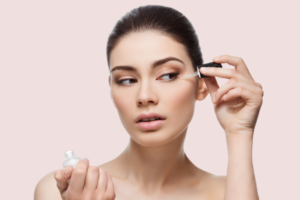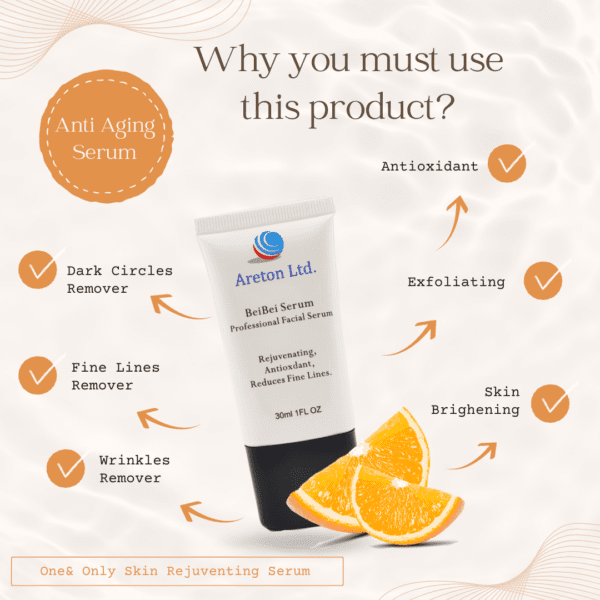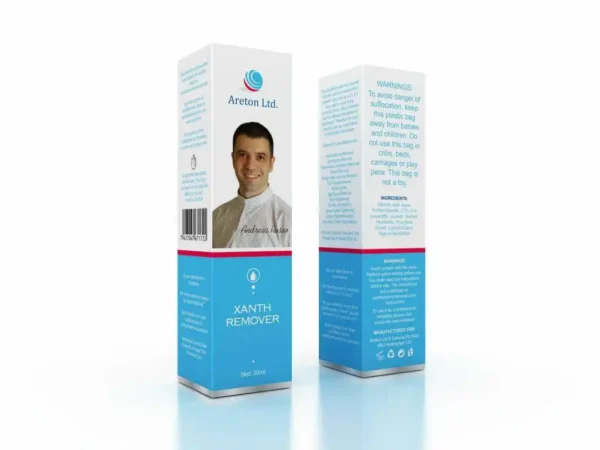[vc_row][vc_column][vc_column_text]
Retinol
Retinol is a synthetic vitamin A derivative that belongs to the larger class of retinoids. Through specific enzymes present in the skin, this substance will change into retinoic acid when applied topically. Although retinoic acid can be used topically, it is harsher than retinol creams or serums since it does not organically convert over time.
The use of retinol as a treatment for acne was first authorised in the 1970s. It aids in cell turnover and avoids pore blockage. This will enhance the way your skincare products penetrate your skin and aid in the defence against blemishes. Additionally, it will support your entire skincare regimen and maximise outcomes.
The over-the-counter beauty and skincare products you can buy all include retinol. You can even visit a cosmetic doctor who will perhaps give you retinol prescription. Your skin may become softer, smoother, and more luminous after using retinol. While increasing collagen production, it will assist in reducing fine lines and wrinkles.
There are several different strengths of retinol. I advise beginning with a 0.25 to 0.5 strength and using it two to three times each week. You can use it four nights a week if your skin is not irritated. Use retinol products only; avoid using Retin-A products, which are significantly more potent than retinol.[/vc_column_text][vc_single_image image=”9012″ img_size=”full” alignment=”center”][vc_empty_space][/vc_column][/vc_row][vc_row][vc_column][vc_column_text]
What is Retinoid ?
The term “retinoid” refers to both prescription-strength retinoic acid and over-the-counter retinol. Retinoids come in three varieties that are available over-the-counter: retinyl palmitate, retinaldehyde, and retinol. Tretinoin (Retin-A) and Tazarotene are two types of retinoid available only by prescription. The strongest retinoid is tazarotene.
What Is Vitamin A ?
Retinoids and carotenoids are the two different kinds of vitamin A, a necessary nutrient. Both forms are transformed into retinol by the body, which is then either stored in the liver or transported throughout the body. Retinol can boost collagen formation and speed up skin cell turnover when given topically.[/vc_column_text][vc_empty_space][/vc_column][/vc_row][vc_row][vc_column][vc_column_text]
5 Main Benefits of Retinol
There are many benefits to retinol, but there are 5 main reasons why people buy and use retinol. Here we will discuss those reasons further.
[/vc_column_text][vc_row_inner][vc_column_inner width=”1/2″][vc_column_text]
#1 Retinol Can Clear Your Acne
Are your acne symptoms resistant to treatment? You may only require retinol. Retinol clears skin and stops new breakouts from occurring by unclogging pores. Naturally, fewer acne scars will be the outcome of less acne. Additionally, retinoids can enhance the effects of other prescription creams and gels, enabling you to benefit to the fullest extent from all of your current therapies.
[/vc_column_text][/vc_column_inner][vc_column_inner width=”1/2″][vc_single_image image=”9017″ img_size=”full”][/vc_column_inner][/vc_row_inner][vc_column_text]
#2 Retinol Can Fight Signs Of Aging
Retinol is one of the most popular and thoroughly researched anti-aging compounds available, so you can relax. Tretinoin was first promoted as an anti-acne medication in the 1970s, but it soon became clear that it also had powerful anti-aging properties.[/vc_column_text][/vc_column][/vc_row][vc_row][vc_column][vc_row_inner][vc_column_inner width=”1/2″][vc_column_text]
#3 Retinol Can Help Even Skin Tone
Retinol has a number of noteworthy properties, one of which is the stimulation of skin cell turnover, or what is sometimes referred to as a “exfoliating” effect. Dry, dull skin is replaced by fresh, vibrant skin that is more evenly toned and has more collagen and elastin. The thicker skin is more durable, smoother, and generally less flawed. Retinol can therefore have radiating effects on skin that is comparatively “problem-free”.
#4 Retinol Is Cost-Effective
Purchasing retinol may seem like an extravagance that you cannot afford, depending on your financial situation. Spending money on less expensive, temporary fixes, however, can turn out to be more expensive in the long run. One of the few chemicals, retinol, has advantages that science has shown, making it a sound investment for the future.[/vc_column_text][/vc_column_inner][vc_column_inner width=”1/2″][vc_single_image image=”9020″ img_size=”full”][/vc_column_inner][/vc_row_inner][vc_column_text]
#5 Available In Prescription Or Over-The-Counter
An over-the-counter retinoid should be sufficient to get started for the majority of folks. With a lesser risk of irritation, the smaller dosage enables the skin to adjust to the substance. Additionally, retinol at these lower levels has less negative effects than retinoic acid at prescription strength. The downside is that it can take longer to see tangible benefits. Consult your dermatologist or plastic surgeon if you are unsure about the dosage that is required.[/vc_column_text][/vc_column][/vc_row][vc_row][vc_column][vc_column_text]
Full List of Benefits:
• Treat acne
• Clear pores
• Amp up cellular turnover
• Increase collagen promotes elasticity
• Decrease hyperpigmentation
• Brighten skin
• Diminish and prevent fine lines and wrinkles
• Refine skin texture and tone
[/vc_column_text][vc_single_image image=”9024″ img_size=”full”][vc_column_text]
To improve the appearance of skin
Due to its impact on collagen formation and cell turnover, retinol can enhance the look of uneven skin tone and textureTrusted Source. Additionally, it helps skin glow.
According to a short study from 2020, participants who used retinol serums at dosages of 0.3 percent and 0.5 percent for 8 weeks saw a reduction in hyperpigmentation and unevenness. The patients who used the 0.5 percent serum, however, reported having symptoms more frequently, according to the study.
In a 2019 study, people of colour were included in subjects to examine the benefits of a 3 percent intensity retinol peel. According to the study, the peel markedly enhanced skin tone and pigmentation. This therapeutic alternative, according to the experts, is secure and efficient for persons with all types of skin.
The use of retinol should be cautious for those with dark skin, nevertheless. Hyperpigmentation may be brought on by inflammation, which may occur.
We advise anyone utilising retinol to begin gradually and keep an eye on its effects.[/vc_column_text][vc_empty_space][/vc_column][/vc_row][vc_row][vc_column][vc_column_text]
Why Choose Retinol ?
[/vc_column_text][vc_row_inner][vc_column_inner width=”1/2″][vc_column_text]One of the most popular retinoids is retinol because it may be purchased over-the-counter and is less likely to irritate “beginners.” After all, even excellent things can be had in excess. If you use too much retinol, your skin may get inflamed, swollen, and peel. Retinol, regardless of age, has the potential to be one of the most proactive and preventative treatments for your skin when used cautiously.
Is Retinol Dangerous ?
Retinol has a lengthy history of being linked to dry, peeling skin, which makes it intimidating to many individuals. Retinol is actually a substance that has undergone extensive investigation and has a reputation for being reliable in the medical field. As far as we are aware, using retinol has no long-term negative effects. While some side effects may be unpleasant to some (it is usual for symptoms to “get worse before they get better”), most can be readily managed with the right planning.[/vc_column_text][/vc_column_inner][vc_column_inner width=”1/2″][vc_single_image image=”9026″ img_size=”full”][vc_empty_space][/vc_column_inner][/vc_row_inner][vc_empty_space][/vc_column][/vc_row][vc_row][vc_column][vc_column_text]
What Are the Side Effects of Retinol ?
Retinol is often misunderstood to thin skin. However, rest assured that this is untrue. Your skin will actually thicken and become stronger after you incorporate retinol into your routine because it increases the creation of collagen. Peeling and flaking typically worsen when you first start using retinol and ultimately go away. Similar to how your skin needs time to adjust to retinol, acne may get worse before it gets better. Skin dryness is another typical retinol adverse effect. With consistent moisturising, you might be able to control this symptom as well as others.
How Does Retinol Keep You Looking Young ?
Retinol, a substance from the retinoid family, eliminates any free radicals that may be harming the collagen in the skin. As you become older, your body will naturally start to create less collagen. Retinol can thicken the layer of skin where wrinkles develop, encourage the synthesis of new collagen, and help maintain your collagen reserves. As a result, already present wrinkles and fine lines could be “smoothed over.” The creation of fresh collagen will also stop wrinkles from developing.[/vc_column_text][/vc_column][/vc_row][vc_row][vc_column][vc_column_text]
Can I Use Retinol Around My Eyes ?
[/vc_column_text][vc_row_inner][vc_column_inner width=”1/2″][vc_column_text]Many people believe that the eye area is too sensitive for retinol treatment. Actually, its anti-aging and smoothing properties are particularly effective on this part of the skin. It’s crucial to remember, though, that you should only use retinol to the area around your eyes if you are certain that the product is mild enough for your skin. Applying retinol to the eye area can be quite drying, so you might want to follow up with a heavy moisturiser. A gel may work better for people with oilier skin than an eye cream for those with drier skin.
How Does Retinol React to Sun Exposure ?
Retinol is well known for making the skin more photosensitive. Many individuals are aware that retinol increases skin’s sensitivity to the sun, to put it simply (and thus, more vulnerable to burns). Retinoids do degrade in the sun, so it’s recommended to only use them at night and to look for opaque containers for your products. Even though it’s not sunny outside, never forget to wear sunscreen because UV radiation is one of the main causes of premature ageing of the skin (and skin cancer).[/vc_column_text][/vc_column_inner][vc_column_inner width=”1/2″][vc_single_image image=”9031″ img_size=”full”][/vc_column_inner][/vc_row_inner][/vc_column][/vc_row][vc_row][vc_column][vc_column_text]
What Retinoids Work Best for Anti-Aging ?
Retinol can be used for anti-aging reasons at any time. Different retinoids, however, work better on various types of skin. Mature skin may require prescription-strength treatments like retinoic acid and tretinoin. These are up to 100 times more potent than retinol products available over-the-counter. But people looking for preventative care may benefit more from beginning with a milder, medical-grade retinol and working their way up. These retinols either come in reduced doses or are encapsulated for a more gradual release. It is best to move slowly if you have youthful skin.
How to Use Retinol for Acne
• Before adding retinol into your regimen if you are currently using any other topical anti-acne medications, speak with a dermatologist or plastic surgeon. Otherwise, your skin could get overwhelmed and irritated right away.
• Introduce retinol gradually into your routine. Retinol is no different from other active ingredients in that your skin takes some time to adjust. Particularly challenging might be the retinization procedure. Apply only every other night at first. After an hour or two, you might wish to wash the cream off if you have sensitive skin. A solid rule of thumb is that you should apply less the more irritated your skin is. If your skin reacts favourably, you can begin using retinol once every night.
• Lower the potential for irritation. You can take extra measures to reduce the likelihood of inflammation in addition to facilitating the retinization process. Wait at least 30 minutes after washing your face before applying a retinol because dry skin doesn’t often sting. Use only what you require, applying a small amount to all afflicted regions and dispersing it as widely as you can.[/vc_column_text][/vc_column][/vc_row][vc_row][vc_column][vc_column_text]
How to use retinol
Retinol is available as a liquid serum, gel, cream, and emollient for topical use.
First-time users of retinol should perform a patch test to be sure their skin does not react unfavourably.
Retinol can be applied once daily, 20 to 30 minutes after washing the face.
Retinol should be introduced to a person gradually and at a low concentration to see how effectively their skin responds to it.
Retional should only be used at night because it can make your skin more sensitive to the sun.
Before using, a person should read the product’s directions because retinol-containing treatments come in a variety of concentrations. To avoid sun damage, one should use sunscreen after taking retinol.
Summary
Retinol is a form of retinoid, which is a vitamin A derivative. This less potent retinoid is available over the counter in a number of different formulations.
Retinol can help treat issues like acne while also enhancing skin tone and texture. Retinol also slows down the signs of ageing by promoting collagen synthesis and cell renewal.
Retinol frequently causes itchy, dry, and flushed skin as adverse effects.
Retinol can be used once daily. One should use sunscreen after using retinol because it can make skin more sensitive to the sun.[/vc_column_text][/vc_column][/vc_row][vc_row][vc_column][vc_empty_space][vc_column_text]
Areton Retinol Based Products
[/vc_column_text]



